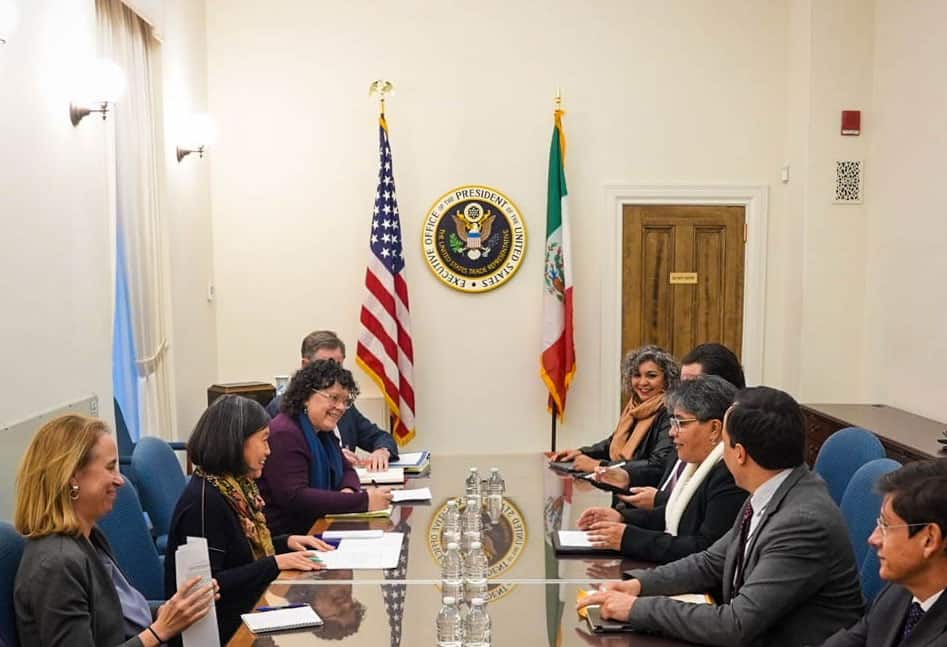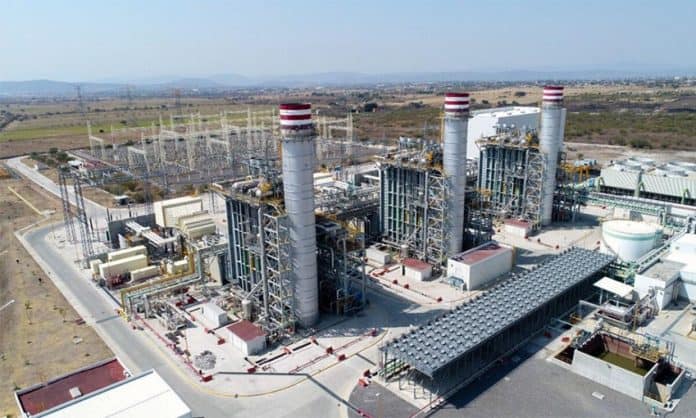The federal government has proposed additional talks with its United States and Canadian counterparts to resolve differences over Mexico’s nationalistic energy policies as it strives to avoid an escalation of the dispute.
In July, both the U.S. and Canada requested dispute settlement consultations with Mexico, arguing that the Mexican government is violating the USMCA trade pact with policies that favor state-owned energy companies over private and foreign ones, including many that generate renewable energy.
No resolution was reached in an initial 75-day period of consultations, allowing the U.S. and Canada to request a dispute panel to settle the case, but the three countries agreed to continue talks past the Oct. 3 deadline.
As part of that process, Economy Minister Raquel Buenrostro met with United States Trade Representative Katherine Tai in Washington, D.C., on Thursday.

According to an Economy Ministry (SE) statement, Buenrostro proposed establishing “trinational working groups” that would meet in December and early January to “deal with the different aspects of the energy consultations.”
“If this plan is carried out satisfactorily, the progress could be presented at the North American Leaders’ Summit to be held in our country on Jan. 9 and 10, 2023,” the SE said.
“It was highlighted that Mexico seeks to reconcile differences in the consultation phase, without the need of reaching an arbitration panel and [while] guaranteeing national sovereignty.”
If a panel ruled in favor of the U.S. and Canada, those two countries could impose punitive tariffs on Mexican imports.
The SE statement said that Buenrostro — a former tax agency chief who became Economy Minister in October — told Tai that Mexico “has the will to build tangible and mutually satisfactory solutions to all issues,” especially the energy conflict.
“The Economy Ministry team extended an invitation to the team of the Office of the United States Trade Representative to hold the third round of energy consultations in Mexico City in the coming days,” it added.
The ministry also said that Buenrostro expressed Mexico’s willingness to attend to “all aspects” of the energy consultations, “prioritizing those in which a solution can be found more quickly.”
In its own statement, the Office of the United States Trade Representative said that Tai “underscored the urgency of prompt and meaningful progress in our ongoing consultations under the USMCA regarding Mexico’s energy measures and Mexico’s enforcement of its fisheries-related environmental laws.”

Better enforcement of fisheries-related environmental laws could help protect the critically endangered vaquita marina porpoise from illegal fishing.
Tai also “reiterated the importance of the full implementation of the USMCA’s prohibition on the importation of goods made with forced labor” and “stressed the importance of avoiding any disruption in U.S. corn exports to Mexico, including for both feed and human consumption, and adherence to a science- and risk-based regulatory approval process for all agricultural biotechnology products in Mexico,” according to the statement issued by her office.
United States Agriculture Secretary Tom Vilsack met with President López Obrador in Mexico City on Monday, and subsequently released a statement saying that he expressed the “United States Government’s and our producers’ deep concerns around … López Obrador’s 2020 decree to phase out the use and importation of biotech corn and other biotechnology products by January 2024.”
“We must find a way forward soon and I emphasized in no uncertain terms that – absent acceptable resolution of the issue – the U.S. Government would be forced to consider all options, including taking formal steps to enforce our legal rights under the USMCA,” Vilsack said.
The SE said that a delegation of Mexican officials will meet with Vilsack in coming days to discuss biotechnology issues.
In addition to phasing out genetically modified corn imports, López Obrador decreed the elimination of the controversial herbicide glyphosate by 2024.
The president said Tuesday that the ban on GM corn imports for human consumption would be implemented as scheduled, but indicated that shipments of such corn for use as livestock feed could continue past 2024 as an analysis into its impact on health — “even when it’s used as fodder” — takes place.
Mexico News Daily
